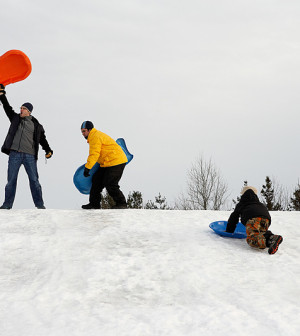- Could Your Grocery Store Meat Be Causing Recurring UTIs?
- Are You Making This Expensive Thermostat Error This Winter?
- Recognizing the Signs of Hypothyroidism
- 10 Strategies to Overcome Insomnia
- Could Artificial Sweeteners Be Aging the Brain Faster?
- Techniques for Soothing Your Nervous System
- Does the Water in Your House Smell Funny? Here’s Why
- Can a Daily Dose of Apple Cider Vinegar Actually Aid Weight Loss?
- 6 Health Beverages That Can Actually Spike Your Blood Sugar
- Treatment Options for Social Anxiety Disorder
Dogs Can Get Jealous, Too


Jealousy may not be the sole domain of humans, with new research showing dogs can get downright possessive when it comes to the love of their master.
When their owners showed affection toward what was actually a stuffed dog, the real puppies in the study responded by snapping or pushing the stuffed dog aside, report researchers from the University of California, San Diego (UCSD).
This jealous streak only surfaced when owners were attending to the stuffed dog and not when they were occupied with random objects. However, this was no ordinary stuffed dog: It was engineered to bark, whine and wag its tail convincingly.
Since jealously is generally believed to be an emotion that requires more complex thinking, the researchers suggested there could be a more basic form of jealousy specific to dogs and some other social animals that helps protect their bonds and ward off outsiders.
“Many people have assumed that jealousy is a social construction of human beings — or that it’s an emotion specifically tied to sexual and romantic relationships,” study co-author Christine Harris, a psychology professor at UCSD, said in a university news release. “Our results challenge these ideas, showing that animals besides ourselves display strong distress whenever a rival usurps a loved one’s affection.”
As for whether the puppies in the study viewed the stuffed dog as an actual rival, the researchers pointed to this result as evidence that they did: 86 percent of the puppies sniffed the stuffed dog’s rear end.
The study, published July 23 in the journal PLOS ONE, involved 36 puppies. Each dog was just 6 months old. All of the puppies were tested separately and videotaped.
During the test, owners were told to ignore their dog and turn their attention to three different objects. First, the owners attended to the realistic-looking stuffed dog. Then they focused on a pail. The third object in the test was a book.
In observing the dogs’ behavior, the researchers looked for signs of aggression, attention-seeking and interest in their owner or the objects. The test was designed to help the researchers determine if the dogs felt an emotion similar to jealousy, or if they were just generally annoyed when they lost their owners’ attention.
The dogs demonstrated more jealous behaviors when their owner focused on the stuffed dog than when their owner paid attention to the other objects, the study found. These behaviors included trying to come between their owner and the stuffed dog, pushing their owner and snapping when the owners displayed affection toward the stuffed dog.
The researchers concluded a form of primitive jealousy that exists in babies may also exist in at least one other social animal: dogs. This emotion, the study’s authors suggested, may have evolved to help infants compete for resources from their parents, including food, attention, love and care.
More information
The ASPCA provides more information on dog behavior.
Source: HealthDay
Copyright © 2026 HealthDay. All rights reserved.










